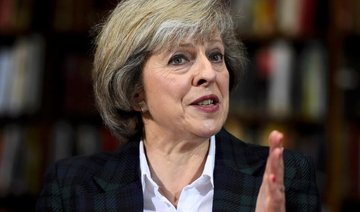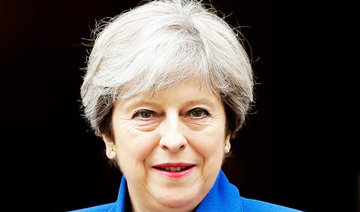LONDON: Britain’s government is to undergo a reshuffle on Monday as Prime Minister Theresa May looks to reassert her authority following a string of high-profile departures, according to MPs.
Deputy prime minister Damian Green is set to be replaced after stepping down last month over a pornography scandal, following on from the departures of ministers Michael Fallon and Priti Patel embroiled in separate controversies.
“Damian Green’s departure before Christmas means that some changes do have to be made, and I will be making some changes,” May told BBC’s Andrew Marr Show on Sunday.
A Labour MP who wished to remain anonymous told AFP that the reshuffle would take place on Monday, having received confirmation from Conservative colleagues.
May’s Downing Street office also said that widespread reports that cabinet ministers would discover their fate on Monday were not inaccurate.
Green’s resignation came as part of a broader scandal over sexual harassment at Westminster, which prompted defense minister Fallon’s departure in November.
He was controversially replaced by chief whip Gavin Williamson.
Fallon’s resignation was followed a week later by that of Patel, Britain’s overseas aid minister, who stepped down over unauthorized meetings in Israel, but neither event triggered a reshuffle.
Former minister for armed forces Penny Mordaunt assumed Patel’s position on November 9.
Health Secretary Jeremy Hunt is believed to be in line to take over Green’s role, but a winter crisis in the National Health Service that has led to delays to operations and hospital admissions, may have postponed the move.
The Sunday Telegraph also reported that education minister Justine Greening and party chairman Patrick McLoughlin were facing the sack.
Leading figures such as foreign minister Boris Johnson, finance minister Philip Hammond and Brexit Secretary David Davis are expected to stay in their roles.
May is also predicted to promote more women and racially diverse members.
Justice minister Dominic Raab, an ardent Brexit supporter, is reported to be in line for a top job.
May’s Brexit focus has now shifted toward what future relationship Britain will forge with the European Union, and she told Andrew Marr that she was looking for a trade deal that applied to goods and services.
“We want as frictionless and tariff-free relationship with the European Union as possible,” said the prime minister.
May was severely weakened in June when she lost her majority after calling a snap general election, but no challengers came forward and she ended the year strengthened after negotiating the first stage of Brexit.
She told Marr that she still hoped to lead her party into the 2022 election, saying: “I’m not a quitter. I’m in this for the long term.”
“Obviously I serve as long as people want me to serve,” she added.
British government set for Monday reshuffle
British government set for Monday reshuffle













